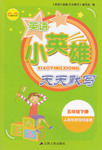题目内容
In 1979, Adrian was so badly affected by his wife’s death the he tried to his sorrow with alcohol.
- A.drown
- B.accumulate
- C.settle
- D.announce
A

练习册系列答案
 英语小英雄天天默写系列答案
英语小英雄天天默写系列答案 暑假作业安徽少年儿童出版社系列答案
暑假作业安徽少年儿童出版社系列答案
相关题目
题目内容

 英语小英雄天天默写系列答案
英语小英雄天天默写系列答案 暑假作业安徽少年儿童出版社系列答案
暑假作业安徽少年儿童出版社系列答案